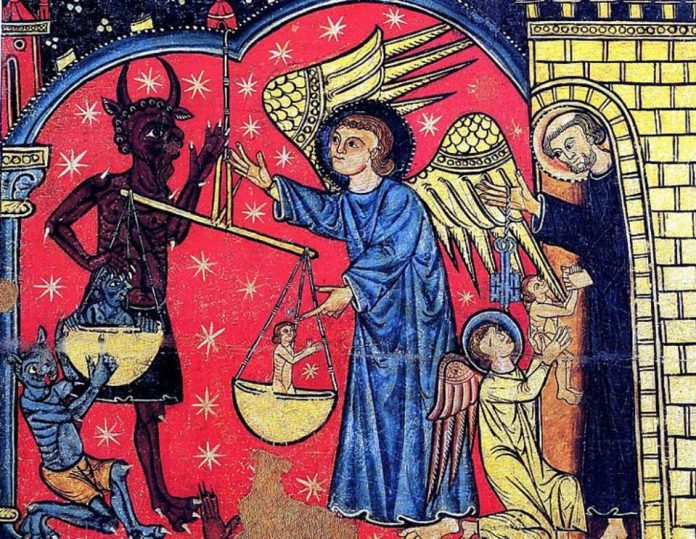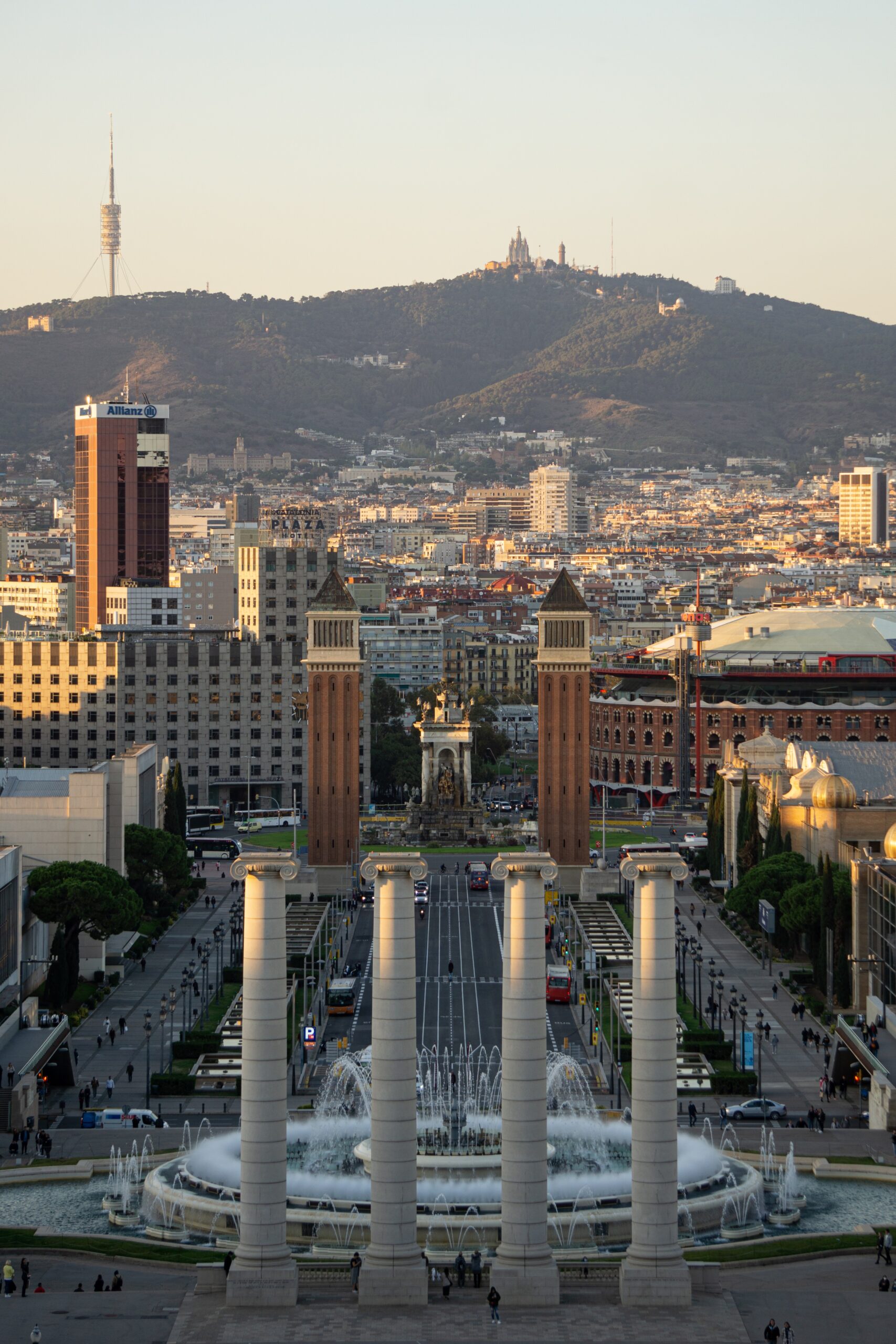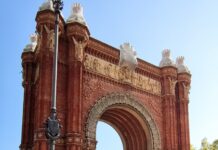The dualism of good and evil.
 Catharism was one of several religious movements that emerged during the Middle Ages becoming deeply rooted in Occitania and threatening the foundations of Roman Catholicism.
Catharism was one of several religious movements that emerged during the Middle Ages becoming deeply rooted in Occitania and threatening the foundations of Roman Catholicism.
The guiding ideal of the Cathars was to return Christianity to its primitive origins and, seeking to counter the opulent worldliness of the Catholic Church. This Christian reform movement won widespread social acceptance from the tenth to the thirteenth centuries. However, Catharism contains certain pagan reminiscences, most notably of a Gnostic and Manichaeist provenance, which influenced its interpretation of the New Testament.
Cat-worshipping Satanists?
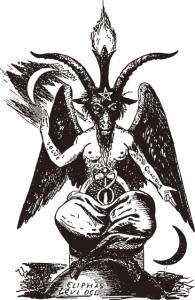 Much has been written about the etymology of the word. Most scholars, if they accept that the term is legitimate, which some do not as it is noticeably absent from most of the extant medieval documentation, claim that its origin is probably in the Greek New Testament καθαροί (‘the pure ones’); others have claimed that it was a derogatory term derived from the low Latin cattus (‘cat’) or even the German ketzer, apparently denoting cat-worshipping Satanists.
Much has been written about the etymology of the word. Most scholars, if they accept that the term is legitimate, which some do not as it is noticeably absent from most of the extant medieval documentation, claim that its origin is probably in the Greek New Testament καθαροί (‘the pure ones’); others have claimed that it was a derogatory term derived from the low Latin cattus (‘cat’) or even the German ketzer, apparently denoting cat-worshipping Satanists.
These Christians were convinced that there was not one God but two gods diametrically opposed one to the other. The good god was the creator of spiritual reality, whereas the the evil god was the author of material reality contaminated by sin. The theology of Catharism was dualistic, and most scholars accept it took two forms, absolute and mitigated dualism (the latter being more easily reconcilable with orthodox Christian theology).
The Devil was responsible for the creation of material world
 Cathars believed that the Kingdom of God was not this world. They were convinced that the good God was the creator of heavens and souls and, on the contrary, the evil God, or the Devil, was responsible for the creation of the material world, wars and also the Catholic Church.
Cathars believed that the Kingdom of God was not this world. They were convinced that the good God was the creator of heavens and souls and, on the contrary, the evil God, or the Devil, was responsible for the creation of the material world, wars and also the Catholic Church.
Some scholars might argue that they did not believe in the incarnation of the Son of God, since they regarded Jesus Christ as a concept that showed the way to perfection. They defended the idea that a good God would never allow his son to incarnate in material form and, in this sense, pointed to the Old Testament God as the Devil himself and consequently rejected his teachings as well as the dogma of the Trinity and the concept of Hell.
Escaping the veil of the material world
 The Cathars, like Plato and the Vedic scholars, believed that earthly life was simply a place of transit through which pure souls wrapped in a material body are reincarnated again and again until they attain the purity of being able to glimpse the Divinity, which is the only means of escaping the veil of the material world and of rising to immaterial Paradise. But for this, it is necessary to lead an ascetic life and renounce material pleasures that the the work of Satan provides.
The Cathars, like Plato and the Vedic scholars, believed that earthly life was simply a place of transit through which pure souls wrapped in a material body are reincarnated again and again until they attain the purity of being able to glimpse the Divinity, which is the only means of escaping the veil of the material world and of rising to immaterial Paradise. But for this, it is necessary to lead an ascetic life and renounce material pleasures that the the work of Satan provides.
They denied the validity of Baptism because water is a material element and therefore impure. They denied the value of sex for the purpose of procreation, since they considered it a grave error to bring a pure soul into this material world. And, for the same reason, they also refused to eat food deriving from sexual reproduction, including all meat, eggs and dairy products. Fish were exempt, since they thought that fish reproduced asexually.
Cathars cared for the most vulnerable people in society
 These strict rules were only fulfilled by the Perfects, the spiritual leaders of the Cathar communities. In practice, few believers actually followed the doctrines strictly. Therefore, they were divided into two groups: ordinary believers (credentes), and spiritual leaders (perfecti). However, in spite of their rites, beliefs and radical way of understanding the faith, it was the Cathars who welcomed and cared for the most vulnerable people in society (poor, widows, orphaned children, etc.) by promoting gender equality between men and women.
These strict rules were only fulfilled by the Perfects, the spiritual leaders of the Cathar communities. In practice, few believers actually followed the doctrines strictly. Therefore, they were divided into two groups: ordinary believers (credentes), and spiritual leaders (perfecti). However, in spite of their rites, beliefs and radical way of understanding the faith, it was the Cathars who welcomed and cared for the most vulnerable people in society (poor, widows, orphaned children, etc.) by promoting gender equality between men and women.
Respected and appreciated by civil society, they translated the Sacred Scriptures from Latin into the Occitan language, the vernacular tongue of their parishioners. In addition, they taught orphans literacy skills while instructing them in the basic tenets of the Cathar faith such as nonviolence and the importance of honesty, which they considered the highest value of respect in a society. In fact, the honesty of the Cathars became proverbial, and all strata of society entrusted their money to them. They, in turn, lent usually to other less favoured citizens to set themselves in a trade and get out of misery, or to anyone who wanted to dedicate themselves to the arts or make progress in the field of learning and letters. The money loaned had to be returned little by little to serve others who needed it. The Cathars created the first European ethical banking system.
Occitania was declared a land contaminated by heresy.
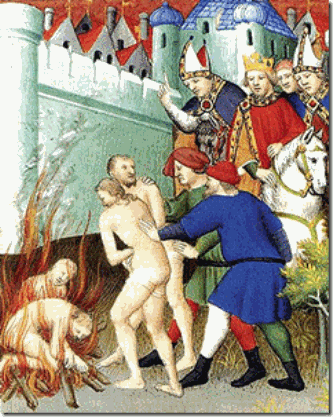 They also contributed to making Occitània most splendid in the cultural, scientific and political spheres of Medieval Europe. However, the fact that they did not practise usury did not please those who did and over time this added to the threat posed by Cathar political and economic systems. This situation contributed an additional external motive for the persecution of the Cathars as heretics and consequently, Occitania was declared a land contaminated by heresy. The first to try to contain the advances of the Cathar faith was Pope Innocent III, who unleashed a crusade of Christians against Christians in those lands. Later, the interests of the king of France would be added, who seized the opportunity to annex to his small kingdom the extensive and rich lands of the Midi.
They also contributed to making Occitània most splendid in the cultural, scientific and political spheres of Medieval Europe. However, the fact that they did not practise usury did not please those who did and over time this added to the threat posed by Cathar political and economic systems. This situation contributed an additional external motive for the persecution of the Cathars as heretics and consequently, Occitania was declared a land contaminated by heresy. The first to try to contain the advances of the Cathar faith was Pope Innocent III, who unleashed a crusade of Christians against Christians in those lands. Later, the interests of the king of France would be added, who seized the opportunity to annex to his small kingdom the extensive and rich lands of the Midi.
Persecuted, condemned and systematically executed until their extinction, with the fall of the Cathars fell beautiful Occitania devastated, razed to the ground and ravished, with her people subjected to genocide for their valiant attempt to defend tolerance and the freedom of ideas, putting people’s lives before religious beliefs . Surprisingly, most Occitans remained Catholics and disagreed with that Cathar duality of good and evil, especially with the concept that the world was the work of Satan. Nevertheless large sections of the Occitan nation were willing to die to defend the rights of the believers.
Shame at the crimes committed against the Occitans
 In the midst of the apocalyptic vision of the Holy Roman Inquisition, we must assume that Catholics felt a deep sense of shame at the crimes committed in their name against the Occitans. At the same perhaps not a few of them wondered whether it was not Satan himself the only God capable of being worshipped by a world fuelled by violent fundamentalisms. The only purpose of religious fundamentalism is to remove our fragile souls away from the consciousness that guides us to Paradise, where lives and freedoms are respected.
In the midst of the apocalyptic vision of the Holy Roman Inquisition, we must assume that Catholics felt a deep sense of shame at the crimes committed in their name against the Occitans. At the same perhaps not a few of them wondered whether it was not Satan himself the only God capable of being worshipped by a world fuelled by violent fundamentalisms. The only purpose of religious fundamentalism is to remove our fragile souls away from the consciousness that guides us to Paradise, where lives and freedoms are respected.
#Òc
